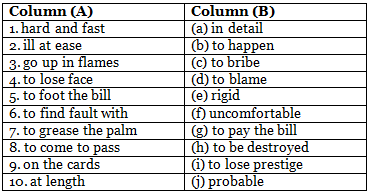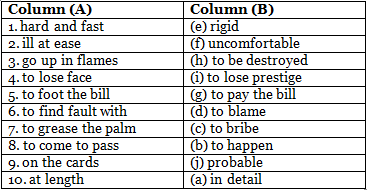Worksheet Solutions: Phrases & Idioms | English Grammar Basic - Class 10 PDF Download
Q1: Use the following idioms in sentences of your own:
(i) Off and on
(ii) In the air
(iii) To come to light
(iv) Call it a day
(v) In a nutshell
Ans:
(i) Off and on– Our principal addresses the students off and on
(ii) In the air — Corruption is in the air all over the country.
(iii) To come to light – Many strange facts came to light during course of enquiry.
(iv) Call it a day — It is very late now; we should call it a day.
(v) In a nutshell – He explained everything to me in a nutshell.
Q2: II. Match the idioms in column A with their meanings in column B:
Ans:
Q3: Each sentence given below contains an idiom/phrase. From the given alternatives, choose the one that best expresses the meaning of this idiom/phrase.
(i) He has the gift of the gab.
(a) He is gifted
(b) He is a chatterbox
(c) He is a good conversationalist
Ans: (c)
(ii) Parental property has become a bone of contention between the siblings.
(a) unifying factor
(b) cause of quarrel
(c) cause of rivalry
Ans: (b)
(iii) Once in a blue moon, we meet each other.
(a) Frequently
(b) Sometimes
(c) Very seldom indeed
Ans: (c)
(iv) He has been jobless for several months, and it is his wife who keeps the pot boiling.
(a) Keeps the fire burning
(b) Avoids starvation
(c) Keeps firing
(d) Gets angry
Ans: (a)
(v) In the end he had to eat the humble pie.
(a) apologize humbly
(b) defend himself vigorously
(c) adopt an aggressive attitude
Ans: (a)
Q4: Directions: In each of the following questions, an idiomatic expression/a proverb has been given, followed by some alternatives. Choose the one which best expresses the meaning of the given idiom proverb.
(i) To be up and doing
(a) To recover from illness
(b) To be actively engaged
(c) To progress satisfactorily
(d) To be expressive and explicit
Ans: (b)
(ii) To stop talking and start to take somebody for a ride. (M.B.A. 1990)
(a) To provide entertainment
(b) To keep the company
(c) To deceive or humiliate him
(d) To exploit a person cool one’s heels
Ans: (d)
(iii) To rest for sometime
(a) To give no importance to someone
(b) To remain in a comfortable position
(c) To be kept waiting for sometime
Ans: (c)
(iv) By the rule of thumb
(a) the use of force
(b) By the use of trickery
(c) By cheating and deception
(d) By practical experience which is rather rough
Ans: (d)
(v) A fool’s errand
(a) A blunder
(b) An impossible task
(c) A useless undertaking
(d) None of these
Ans: (c)
|
20 videos|143 docs|18 tests
|
FAQs on Worksheet Solutions: Phrases & Idioms - English Grammar Basic - Class 10
| 1. What are some common phrases and idioms used in the English language? |  |
| 2. How can I improve my understanding and usage of phrases and idioms? |  |
| 3. Are phrases and idioms the same in every English-speaking country? |  |
| 4. Can phrases and idioms be translated literally into other languages? |  |
| 5. Are there any online resources available for learning and practicing phrases and idioms? |  |
















